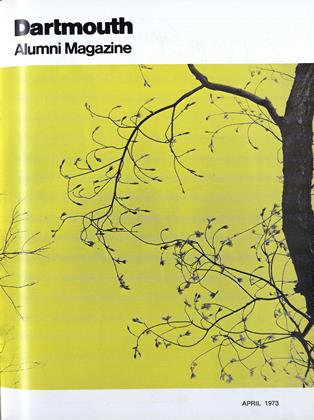Don Bliss '18 appears in a new role. Heretofore he has been internationally known as a career man in the Foreign Service from 1923 to 1961. He was stationed in Tokyo, Bombay, Batavia, Alexandria, Singapore, Prague, The Hague, Cairo, Paris, Calcutta, London, Ottawa, Addis Ababa, and Washington. From 1961 to 1965 he was consultant to the State Department. Now he is being acclaimed, and so is his wife Gabriela, as translators of a book receiving wide attention, Cervantes: The Man and the Genius (New York: Charterhouse, 397 pp., $9.95.) Gabriela is Gabriela De Cubas whom Don Bliss married in 1946. Privately educated, the daughter of a Spanish diplomat, Mrs. Bliss was brought up in European capitals, devoted herself to painting, and has been active in preparing correspondence of Spanish literary figures for publication in Spain. She is the sister-in-law of Bradford Stone '46 and . the niece of the author.
The name of the author is Francisco Navarro Ledesma, a Spanish writer and critic who died at only 36 shortly after completing his book in 1905, El Ingenioso Hidalgo Miguel de CervantesSaavedra. A contemporary of Shakespeare, Cervantes left behind far more documentary evidence of his life, but throughout the centuries Cervantes and Don Quixote were mingled indiscriminately, and the real Cervantes became lost in myth. Even the popular musical Man of La Mancha fails to distinguish between the writer and his creation.
The Dean of Libraries, New York University, George Winchester Stone Jr. '3O, praises the book with particular eloquence. "What a pleasure to read a leisurely written and sensitive biography of one of the great idealist-satirists of the western world. ... This translation opens to English speaking readers the feeling of convents an choirs, for streets in health and in sickness, for fields, flatlands, and sunsets, for courts an cathedrals, for armies and the underworld; for treachery and triumph; for the wash of waves on Algerian coasts. ... The tale is absorbing and the translators have equipped it with just the kind fo clarifying notes and bibliographical suggestions to satisfy the modern reader."
An example of how the College transcends Hanover and how a Dartmouth professor eludes a possible temptation to immure himself in a library cubicle may be shown by the second edition of A Handbook for the New HampshireGeneral Court. Its basis is papers written by seven Dartmouth students for a Government seminar conducted by Prof. Laurence I. Radway, a former minority leader in the New Hampshire House of Representatives. These papers were edited and worked into a coherent whole by Carole Sinclair Radway, Professor Radway's daughter, during the summer of 1971 just after her sophomore year at Radcliffe College. Now on leave, under the joint Harvard-Radcliffe Volunteer Teachers for Africa, she is teaching school in Addis Ababa, Ethiopia. The handbook is being distributed to all New Hampshire legislators, voluntary associations like Chambers of Commerce, and to New Hampshire town libraries. Six of the seven students are now graduates: Gordon P. Flint Jr. '71, Newport, N. H.; Robert P. Joy '71, Melrose, Mass.; James P. Knox '71, Plant City, Fla.; Eric D. Ranney '71, Victory, N.Y.; James Stearns '72, Laconia, N.H.; and J. Hans Stumm '72, Aurora, I11. The seventh, Harlan P. Wendall Jr., Greenville, Md., will receive his degree in June.
Many Dartmouth men are aware that Homer Whitford, L.H.D. '66, is author of the music of Dartmouth Undying, the words of which were written by Franklin McDuffee '21, and many will be surprised to learn that it it is only one of a legion of works. For the Church Service Mr. Whitford has composed and arranged no fewer than 84 compositions published by 1.3 different music firms. And they are not all. His compositions and arrangements for concerts number 16; for organ, 67; four arrangements from the classics for organ and two trumpets; 11 for organ and piano duo; one for piano solo; seven for piano, four hands; and one for two pianos, four hands. On the basis of such eternal and creative energy over so many decades one might well coin a phrase, patterned on DartmouthUndying. It would be Homer WhitfordUndying.
 View Full Issue
View Full Issue
More From This Issue
-
 Feature
FeatureMedical Care via Television
April 1973 By BLISS KIRBY THORNE '38 -
 Feature
FeatureGuatemalan Cane Raiser
April 1973 By M.B.R. -
 Feature
FeatureArt Carpenter
April 1973 -
 Feature
FeatureHanover Has A Mardi Gras
April 1973 -
 Article
ArticleFaculty
April 1973 By ROBERT B. GRAHAM '40 -
 Article
ArticleThe Undergraduate Chair
April 1973 By DREW NEWMAN '74
J. H.
Books
-
 Books
BooksALUMNI PUBLICATIONS
March, 1923 -
 Books
BooksAlumni Notes
March 1948 -
 Books
BooksA WOMAN'S BEST YEARS
June 1935 By C. N. Allen '24 -
 Books
BooksMARK TWAIN: THE FATE OF HUMOR.
FEBRUARY 1968 By HENRY L. TERRIE JR. -
 Books
BooksTHE POETRY OF GREEK TRAGEDY.
July 1958 By JOHN B. STEARNS '16 -
 Books
BooksFurther Mention
JUNE 1971 By JOHN HURD 21







